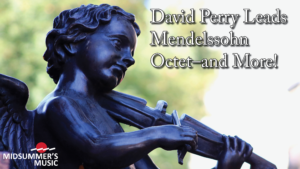 If you create a program consisting of two string octets, you never know what the long-term implications might be. The combination of four violins, two violas, and two cellos it seems can have quite an impact. I was recently going over some correspondence that included a few condolence messages referring to the passing of my wife last fall. One of them was from a couple that had been long-time followers of Midsummer’s Music. Long-time and long-distance.
If you create a program consisting of two string octets, you never know what the long-term implications might be. The combination of four violins, two violas, and two cellos it seems can have quite an impact. I was recently going over some correspondence that included a few condolence messages referring to the passing of my wife last fall. One of them was from a couple that had been long-time followers of Midsummer’s Music. Long-time and long-distance.
They first encountered Midsummer’s Music years ago when we performed at the home of Heather and Mick Helmich in Carlsville. Heather and Mick had just built a wonderful home in the woods, and they had a fantastic new Mason and Hamlin seven-foot grand piano in a living room with a vaulted ceiling and a balcony. It just cried out for a chamber music concert. As it turned out, we played many concerts there over the years. In fact, Heather and Mick still hold the record for hosting the most number of home concerts, although it could be a tie with Dianne and the late Peter Trenchard, where we performed our very first concert 34 years ago.
At any rate, at the first concert in the home of Heather and Mick, among those in attendance were two of their friends from Florida, Connie and Robert. They were smitten with Midsummer’s Music and subsequently attended every concert we played at the Hellmich’s over the next several years. Not only that, they began to plan their three-week vacations in Door County to make sure that they could get to several of our other programs in different locations. So, year after year, we would greet them again and renew our friendship in splendid musical settings.
In her note to me, Connie mentioned this and referred particularly to a program that they had heard us perform that included two octets for strings—Mendelssohn’s Octet, of course, but also a wonderful octet by Joachim Raff. Connie said that whenever she hears either piece now on the radio, it brings back very fond memories of their times in Door County and their friends in Midsummer’s Music. She is particularly touched by that unknown work by Raff she came to love.
This kind of revelatory message is not atypical. It’s just that when you play a particular piece or program, or when you put together a combination of pieces into a unique program, you don’t expect that 20 years later you will find out that it really touched someone. Yet, it has, and it does. And so, we, too, are deeply touched and keep doing it.
This week, the Mendelssohn Octet is on the program. It has been a while, so for some, it will be heard again. For some, it will be the first time. This year however, instead of pairing it with that unknown octet by Joachim Raff (which we will have to do again soon), we are combining the Mendelssohn with another unknown octet—this one by a composer named Woldemar Bargiel. Yes, this work is as unknown as the Raff was back when Connie and Robert first heard it. But I would like to think that 20 years from now, someone will write to me and tell me how it has made such an impression over all those years and is still one of their absolute favorites. It has all those strong and compelling attributes.
I was just at a rehearsal of a different program, and David Perry, our first violinist, told me that he has been working on the Bargiel and really likes it. He thinks it is a real find. I’m very glad to hear that because, if I am going to commit our wonderful players to the hard work of learning a challenging unknown work, I want them to enjoy the experience. For one thing, I don’t want to aggravate them, but more importantly, I know if they really like it, they will convince their audience of its worth as well.
Now, you may wonder, who is Waldemar Bargiel? I didn’t know about him until fairly recently. It turns out he was not at all obscure in the 19th century. He was the stepbrother of Clara Schumann and was encouraged and supported musically by both Clara and her husband Robert. He was also acquainted with Mendelssohn and was a good friend of Johannes Brahms, probably through Clara, who thought highly of his work. His Octet is a very passionate and expressive work, full of wonderful melodies, rich harmonies, and a variety of tempos, textures, and moods. It is bound to make a good first impression on listeners, some of whom may even become fond of it like Connie did with Raff.
You have four opportunities to hear it with the Mendelssohn starting Wednesday, June 19, at Björklunden in Baileys Harbor. It will then be repeated on Friday, June 21, at Sister Bay Moravian Church, Sunday, June 23, at Woodwalk Gallery in Egg Harbor, and the following Thursday, June 27, at the Kress Pavilion in Egg Harbor. All performances start at 7:00 pm except for Woodwalk, which is a 5:00 pm. start, and all are followed by a reception for performers and audience members. Please call (920) 854-7088 or visit www.midsummersmusic.com for tickets or more information.
Jim Berkenstock,
Artistic Director
